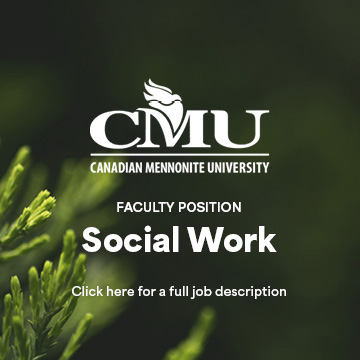When I was asked to write an article for Canadian Mennonite, I did not know where to start. I have so many stories to tell, but these stories are complicated, given the history my homeland, Palestine. It has both a difficult present and uncertain future. I wondered, should I write about the geographical spaces, the land, the conflict or the people. Each of these and many other aspects can be very problematic and there is no easy way to explain them.
Homeland is the name I like to call my country. Home is a very dense concept on its own, without adding the additional layers of being a Palestinian refugee. Many writers, researchers and even philosophers have tried to define the meaning of home. Where I come from is a very beautiful land, but that land is battered with conflict. I was born in a refugee camp, meanwhile the rolling hills of my family home lie only 60 km away in Ajjur, a village I am not allowed to visit, never mind return to. Torn from that family land, I now call Aida refugee camp home. Aida is a word that means “return.”
It turns out, in my country you might find tricky meanings to every word—definitions that you might not find in dictionaries but rather on the ground. Words like camp, prison, wall and apartheid lose their original meaning and become specific to our time and space. Even numbers lose or gain their significance as they become tied to political matters and national history, 1948, 1967 . . .
Where I come from, the living and the dead are also different from what those words mean elsewhere. Here, you can frequently hear terms like “living dead” and “dead living.” Such expressions refer to the everyday life in which some people die so the others can live, or where the mere act of trying to live can lead to death.
Furthermore, daily calm and peace processes can be mistaken for true interpretations of justice and freedom. While it may appear to be peaceful on the surface it does not live up to the true definition of sustainable peace based on principles of justice.
I will tell you a story. It might help you to understand my homeland.
A few months ago, the sun was shining and small children gathered around me before I accompanied some people on a trip to Jericho. One hundred people were leaving the narrow streets, walls and watchtowers of Aida camp on a day adventure.
I remember a child pointing out the window of the bus exclaiming, “Look, this is a banana tree!” With his brown eyes wide open and a big smile of his small face, Sami turned and addressed his brother, Mohammad. When Mohammad heard his brother’s words, he jumped to the window to see these trees. Out of curiosity, I turned my head to see what they were talking about. I looked out of the window and saw a long line of Palm trees on the road to Jericho. No banana tree.
I was surprised; I could neither smile at children’s innocence, nor feel sad for this 12-year-old who grew up in a place where he never saw banana trees. People in the refugee camp buy their bananas from the market. These children are very clever, they learn in school that bananas were planted in Jericho, but there is not enough land in the camp for banana trees so they have never seen them grow. Because of their surroundings and living situation appearances and truth have been confused.
That’s sad! However I knew there was hope that someday this child will learn the difference between banana and palm trees. Similarly I hope he will realize the truth that principles like freedom, peace and justice are just empty words if not practiced. That even though there is a peace process or calm, it is not the same as an everlasting peace based on principles of justice.
In Palestine both life and words are confusing, inverted from what they mean elsewhere. But there is hope that with time, peace and justice will be restored to their true meaning and practiced across my homeland.



Add new comment
Canadian Mennonite invites comments and encourages constructive discussion about our content. Actual full names (first and last) are required. Comments are moderated and may be edited. They will not appear online until approved and will be posted during business hours. Some comments may be reproduced in print.